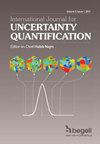Stochastic Galerkin method and port-Hamiltonian form for linear first-order ordinary differential equations
IF 1.8
4区 工程技术
Q2 ENGINEERING, MULTIDISCIPLINARY
International Journal for Uncertainty Quantification
Pub Date : 2024-02-01
DOI:10.1615/int.j.uncertaintyquantification.2024050099
引用次数: 0
Abstract
We consider linear first-order systems of ordinary differential equations (ODEs) in port-Hamiltonian (pH) form. Physical parameters are remodelled as random variables to conduct an uncertainty quantification. A stochastic Galerkin projection yields a larger deterministic system of ODEs, which does not exhibit a pH form in general. We apply transformations of the original systems such that the stochastic Galerkin projection becomes structure-preserving. Furthermore, we investigate meaning and properties of the Hamiltonian function belonging to the stochastic Galerkin system. A large number of random variables implies a high-dimensional stochastic Galerkin system, which suggests itself to apply model order reduction (MOR) generating a low-dimensional system of ODEs. We discuss structure preservation in projection-based MOR, where the smaller systems of ODEs feature pH form again. Results of numerical computations are presented using two test examples.线性一阶常微分方程的随机伽勒金法和端口-哈密顿形式
我们考虑的是端口-哈密尔顿(pH)形式的线性一阶常微分方程(ODE)系统。物理参数被重塑为随机变量,以进行不确定性量化。随机伽勒金投影产生了一个更大的确定性 ODE 系统,该系统一般不呈现 pH 形式。我们对原始系统进行了变换,从而使随机伽勒金投影变得具有结构保护性。此外,我们还研究了属于随机 Galerkin 系统的哈密顿函数的含义和性质。大量的随机变量意味着一个高维的随机 Galerkin 系统,这就建议应用模型阶次削减(MOR)生成一个低维的 ODE 系统。我们讨论了基于投影的 MOR 中的结构保持,其中较小的 ODE 系统再次以 pH 形式为特征。通过两个测试实例介绍了数值计算的结果。
本文章由计算机程序翻译,如有差异,请以英文原文为准。
求助全文
约1分钟内获得全文
求助全文
来源期刊

International Journal for Uncertainty Quantification
ENGINEERING, MULTIDISCIPLINARY-MATHEMATICS, INTERDISCIPLINARY APPLICATIONS
CiteScore
3.60
自引率
5.90%
发文量
28
期刊介绍:
The International Journal for Uncertainty Quantification disseminates information of permanent interest in the areas of analysis, modeling, design and control of complex systems in the presence of uncertainty. The journal seeks to emphasize methods that cross stochastic analysis, statistical modeling and scientific computing. Systems of interest are governed by differential equations possibly with multiscale features. Topics of particular interest include representation of uncertainty, propagation of uncertainty across scales, resolving the curse of dimensionality, long-time integration for stochastic PDEs, data-driven approaches for constructing stochastic models, validation, verification and uncertainty quantification for predictive computational science, and visualization of uncertainty in high-dimensional spaces. Bayesian computation and machine learning techniques are also of interest for example in the context of stochastic multiscale systems, for model selection/classification, and decision making. Reports addressing the dynamic coupling of modern experiments and modeling approaches towards predictive science are particularly encouraged. Applications of uncertainty quantification in all areas of physical and biological sciences are appropriate.
 求助内容:
求助内容: 应助结果提醒方式:
应助结果提醒方式:


